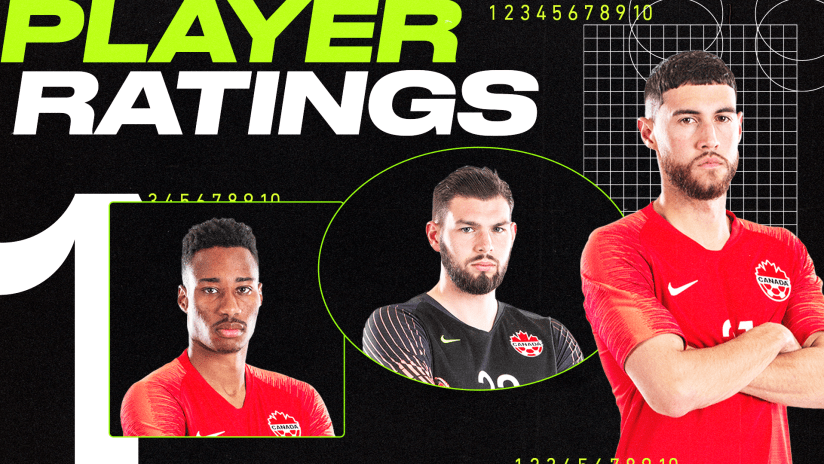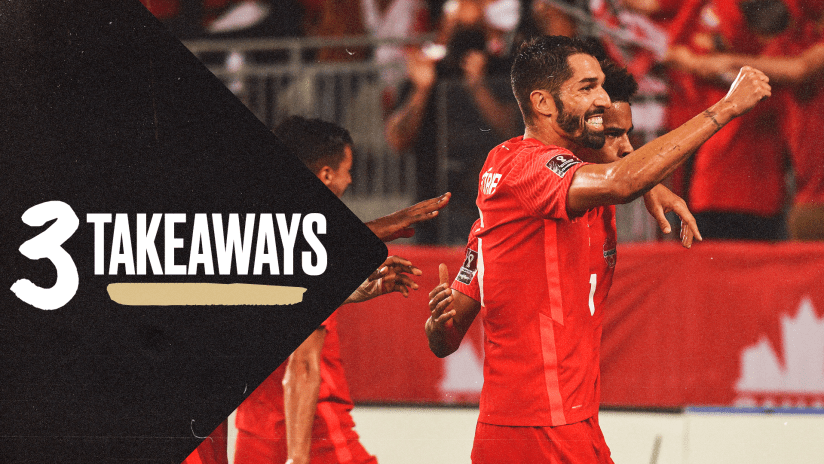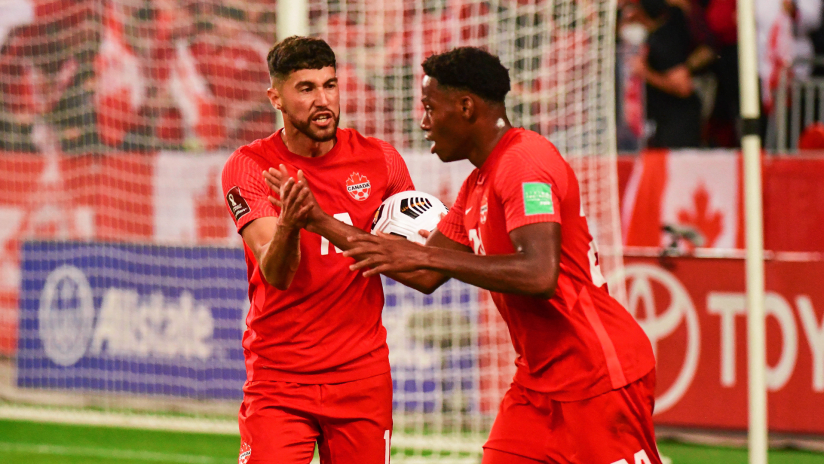TORONTO – Talent has never been an issue for this Canadian men’s national team. It was always a matter of execution and managing the rigors of Concacaf. Those latter two points have been the big themes of Canada’s 2021 and are responsible for Les Rouges’ promising position through six of 14 matches in the Octagonal phase of Concacaf World Cup Qualifying.
Having come from behind for a fourth time in the “Ocho” thus far to defeat Panama 4-1 at BMO Field on Wednesday night, Canada sit in third place with 10 points. That creates a two-point gap over the Panamanians in fourth and a five-point separation from fifth-place Costa Rica, who Canada will play next on Nov. 12 at Commonwealth Stadium in Edmonton. The top three teams will automatically qualify for the 2022 World Cup in Qatar, with fourth place going into an intercontinental playoff.
Having chalked off draws at Estadio Azteca and Independence Park versus Mexico and Jamaica, respectively, Canada are in an advantageous position.
“That was the goal, to stay in the top three after every round,” said Canada coach John Herdman Wednesday night. “We are in a good space, we are heading into Edmonton [for] two more home games. We chose the conditions, we chose the environment, we get a chance to not have to travel. We do get a real opportunity to get to do things our way.”
Averaging 1.6 points per match guarantees an automatic qualification spot based on every previous cycle. Obviously these circumstances are significantly different amid the COVID-19 pandemic and a restructured format, yet the math doesn’t lie. Plus, not having to travel in November and having one fewer game than the three-game September and October windows means less reliance on squad rotation.
The opponents in November, Costa Rica and Mexico, are two of the most battle-tested teams in Concacaf, so these will be challenges. However, based on the conditions and Canada’s current position in the table, it would now be a disappointment if the team failed to finish in the top four, which would’ve been the goal prior to the Octagonal.
Based on how the draw with Mexico transpired on Oct. 7, not to mention the Gold Cup semifinal this past summer, Canada will pose a threat to El Tri at home. In their toughest game of the Octagonal so far, Herdman's squad came from behind to grab a 1-1 draw with the United States in Nashville.
Going into the Gold Cup and subsequent start of World Cup Qualifying, the big question surrounding Canada was whether they could truly emerge as an elite force in Concacaf. Buoyed by the emergence of young players like Alphonso Davies, Jonathan David and Tajon Buchanan, Canada are now making a firm case as a top-three team in the region.
“[Davies] is special, Tajon is special, [Jonathan] David. We have some bright diamonds in this team and it is impressive to see them, the ability to take people one-versus-one and then make things happen."
"Going into the [Estadio] Azteca and playing the way we played with a lot of key players missing … I think what you are seeing is Canada stepped forward,” Herdman said. “I think there is just a lot of pride in this team and trust and confidence that is building."
Whether it’s down to playing in some of the biggest leagues or their recent club successes, this Canadian team has the mental resilience that propels them to victory, especially in games where, historically, they would have wilted after conceding the opening goal.
Canada’s dropped points in their opening game against Honduras at BMO Field felt like a defeat. The Reds conceded right before halftime but pelted the Honduran goal during the second half. The equalizer arrived in short order but a winner never did.
Contrast that with the last two home matches versus El Salvador and Panama, it’s night and day.
"At no point did I feel Canada were ever going to lose [to Panama],” said Herdman. “Even after the first goal went in, it was one attack and they caught us with that sucker punch, but the guys got straight back at it ... Couple of nervy moments, but I said to these guys, we can tolerate some nervy moments. We have got to risk more to gain more and at times, we will have those nervy moments because we know if we are risking, they are going to be opening up and we are absolutely lethal in that transition."
It was fitting, too, that it was Davies who catapulted Canada to a resounding victory over Panama on Wednesday night. His majestic solo effort will live long in the memories of the 26,622 fans who witnessed the goal at BMO Field and the countless others watching the game at home. Even in the draw with Mexico, it was the Bayern Munich star who provided the assist for Jonathan Osorio’s equalizer.
The best players deliver on the grandest stage when their teams need them most. Davies accomplished that in this October window with flying colors.
"He's got that ability and I had that conversation with him about finding that next level tonight,” said Herdman of Davies’ performance on Wednesday. “We were on the sideline thinking he could have to come out here, you could see he was gassing [but] he wants this bad. He really wants this. He dreams of taking this country to a World Cup.
"We have got something special with Alphonso. We know that and I think every team does."
Which begs the question of whether a Canadian is the best player in the region. In the Panama game alone, Davies completed seven of nine dribbles, three key passes – with an assist – and four shots, including his goal. He has another two assists against Mexico and the US as well.
The Vancouver Whitecaps academy product is lifting his country to victory, dominating games against the best in Concacaf and is a key player at one of the world’s biggest clubs in Bayern Munich. On those criteria alone, the only name worthy of inclusion is Costa Rica’s Keylor Navas.
The fact the conversation is being had, though, signifies the strides Canada have made in 2021.












